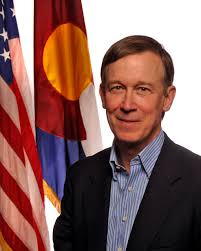Widgetized Section
Go to Admin » Appearance » Widgets » and move Gabfire Widget: Social into that MastheadOverlay zone
Hickenlooper pushes for carbon pricing in Democratic budget reconciliation bill
As negotiations over a high-stakes budget bill begin in Washington, D.C., Colorado Sen. John Hickenlooper told constituents in a virtual town hall on Monday that a carbon-pricing mechanism to combat climate change tops his wish list for the legislation.

“The thing I’d like more than anything is to get a price on carbon,” Hickenlooper said. “It would be so much more efficient if there was some sort of a fee, and a dividend of some sort, that would allow us to incentivize and motivate all of these entrepreneurs all over the country … to find cleaner ways of delivering energy.”
Hickenlooper, a former Democratic governor who unseated GOP Sen. Cory Gardner in 2020, said he will press for carbon pricing to be included in the budget bill in the coming weeks and months. The bill is expected to be passed through the budget reconciliation process, which requires only 50 Democratic votes, following the Senate’s passage of a bipartisan package of $550 billion in new infrastructure spending.
“We couldn’t get it into the infrastructure bill,” Hickenlooper said of a price on carbon. “But I think there’s ways we can get it into reconciliation.”
Carbon-pricing schemes have a complicated history in U.S. politics. In 2009, a cap-and-trade system was the basis of the Democratic climate legislation known as the Waxman-Markey bill, which passed the House of Representatives but died in the Senate.
Over the last decade, experts and activists have debated the feasibility and efficacy of a potential carbon tax, with moderates and business groups — including the fossil-fuel industry itself — tending to favor such a plan, while a growing number of environmentalists have questioned whether a carbon price could be set high enough to make deep emissions cuts on the rapid timeline that scientists say is necessary. E&E News reported earlier this month that while “the idea has fallen out of favor among progressives,” limited carbon-pricing schemes like methane fees and a carbon “border tax” are likely to be included in the reconciliation bill, with some Democrats pushing for more.
Hickenlooper made a carbon tax central to the climate plan put forward by his ill-fated presidential campaign in 2019. As a member of the Senate Energy and Natural Resources Committee, he could play a key role in drafting and negotiating the $198 billion clean-energy component of the Democrats’ reconciliation bill.
“We’ll see,” he said at Monday’s town hall. “If you don’t think about it, and you don’t at least have that dream, then you’re never going to get it.”
Hickenlooper also answered questions about immigration, the COVID-19 pandemic and voting rights, an issue that he said would be “front and center” in the Senate following budget negotiations this fall.
Echoing previous comments, Hickenlooper said that he hoped that Congress could reach a bipartisan agreement on legislation protecting what he called “the fundamental bedrock of democracy” — he expressed support for voter ID requirements in exchange for GOP concessions — but said that the alternative could lead to filibuster reform. Among the threats to voting rights are Republican-led state legislatures that have adopted voting restrictions in the wake of former President Donald Trump’s loss in November, as well the the “big lie” that the election was fraudulent.
“If we cannot find 60 votes just for the most basic protections, I guess then we have to look at beginning to change … the filibuster,” Hickenlooper said. “You certainly don’t want to make major changes, and then two years or four years later when control of both of the houses switches, and maybe the White House switches — you don’t want to be swinging back and forth like a pendulum,” he continued. “(But) if we can’t get to that bipartisan, magical 60-vote total, then we have to look at everything.”
Editor’s note: This story first appeared on Colorado Newsline, which is part of States Newsroom, a network of news bureaus supported by grants and a coalition of donors as a 501c(3) public charity. Colorado Newsline maintains editorial independence. Contact Editor Quentin Young for questions: info@coloradonewsline.com. Follow Colorado Newsline on Facebook and Twitter.


